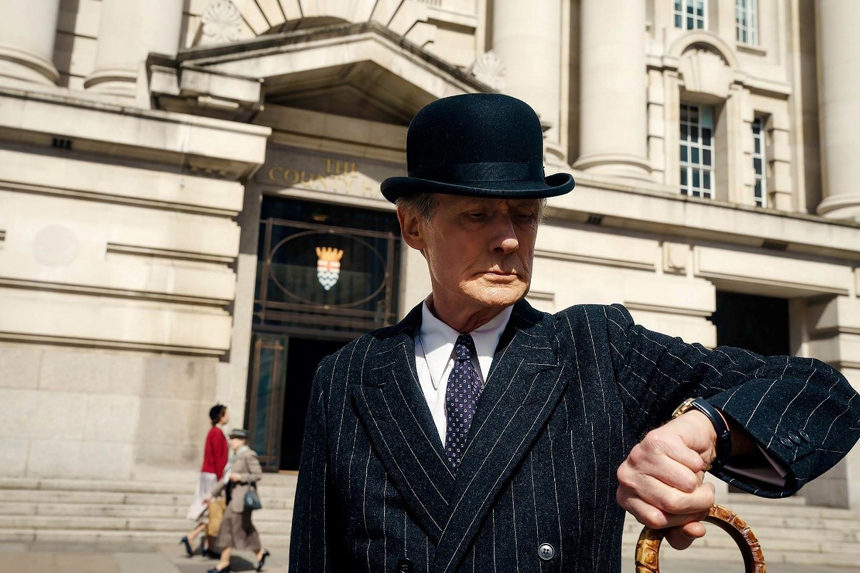Living
⭐️ ⭐️ ⭐️⭐️
Rating: PG-13
Run Time: 1 hour 42 minutes
Stars: Bill Nighy, Aimee Lou Wood, Alex Sharp
Writer: Kazuo Ishiguro (Based on Akira Kurosawa’s Ikuru)
Director: Oliver Hermanus
Reviewed at the Toronto International Film Festival
Upright as the head of a good stout, sentimental as an old Scottish love song, Living comes miraculously close to replicating the exquisite notes of the classic Japanese film on which it is based — and stands as a crowning performance in Bill Nighy’s long and diversified career.
Even 70 years later, Akira Kurosawa’s Ikiru remains one of the loveliest films ever made; the story of a lifelong government bureaucrat who, faced with the reality of his own mortality, sheds his zombie-like manners and decides, at long last, to live a little.
Here the locale is moved from 1950s Tokyo to London, during the same era. Mr. Williams, as he is known to all (it’s not clear anybody is aware of his first name), has become something of a furniture fixture in the Public Works office, a master at shoveling paperwork up the chain…or down. Anything to get it out of his overflowing in-basket.
Into his insular office comes a newbie: Fresh-faced Mr. Wakeling (The Trial of the Chicago 7’s Alex Sharp), intent upon putting the gears of government into motion for the people — soon to discover those gears have been jammed with sawdust pretty much since Queen Victoria’s time. Preparing to leave the same office is pert young Miss Harris (Aimee Lou Wood), who has tired of the drudgery and longs to manage a restaurant.
Sandwiched among the black-suited bureaucrats, Wakeling and Miss Harris form a natural bond. But their shared desire to put humanity above regulatory rumination goes utterly unnoticed by the others.
Everything changes for Williams when he gets some bad news on the health front. Shaken by this reminder of his mortality, Williams does the unthinkable: He skips work and heads for a beach town in the South of England. There he meets and — wildly uncharacteristically — confides his dilemma to a hedonistic struggling novelist (Tom Burke).
“Live a little,” the writer shrugs.
“I don’t know how,” Williams replies.
The writer dutifully tries to show Williams his version of a good time, escorting this hapless specter through the seamy underbelly of Brighton, where the booze flows cheap and the hookers, it appears, steal your bowler hat.
The writer means well, but it’s clear that, for a man of Williams’s demeanor, this isn’t what living is all about.
Back in London, a chance encounter with Miss Harris brings enlightenment. Intrigued by her zest for life — and, truth be told, perhaps a bit infatuated with her — Williams begins to wonder if true Living, with a capital “L,” has been lurking right in front of him all the time.
Soon Williams is back at his old station in the office — this time focusing his attention on one particular project: A proposed playground in a bombed-out London block. For months, he’s been a primary bureaucratic foil of the effort; now, it seems there is no building effort more critical in all of Great Britain.
It is no accident that the film’s script, which closely follows Kurosawa’s original, has been crafted by Nagasaki-born Kazuo Ishiguro (The Remains of the Day). Winner of the Nobel Prize for literature, Ishiguro’s body of work seamlessly spans Eastern and Western cultures, finding dramatic notes that resonate no matter where on the planet they are struck.
From the opening title sequence — vintage typeface superimposed on a Technicolor view of postwar London — South African director Oliver Hermanus makes it clear he is not here to improve on the source material, nor even to update it for a 21st century audience. Some lessons, he seeks to reassure us, are timeless.
As are memorable screen performances. Nighy, the loose-limbed, long-faced actor whose many indelible supporting turns (Love Actually, About Time) have, criminally, too seldom led to starring roles, breathes stilted, frustrated life into Williams. Nighy doesn’t ask his congenital paper pusher to spring from his life-changing catharsis as a new man, infused with youthful energy and enthusiasm, a la Ebenezer Scrooge. Williams’s transformation is painfully internalized, as has been the man’s entire life prior to this.
A wrinkled old caterpillar before he wraps himself into his cocoon, Williams emerges still a caterpillar, but nonetheless, with stiff-upper-lip nobility, able to fly.
Become a Saturday Evening Post member and enjoy unlimited access. Subscribe now



